-
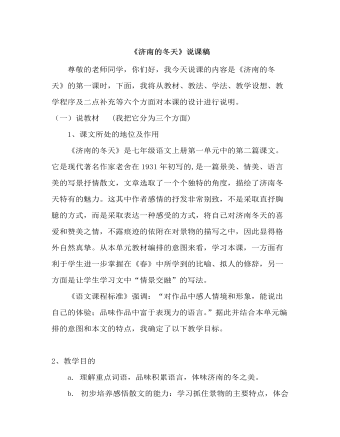
部编版语文七年级上册《济南的冬天》说课稿
这节课我是按“引入新课——讲授新课——反馈练习——归纳总结”进行教学的。 1、引入新课:我先对布置的预习作业进行抽查并明确生字词答案;然后以简洁的话语引入新课,情境导入一年有四季,季季有特色。今天我们单表一下多姿的冬天。和学生一起欣赏燕京一带冬天雪花,感受边塞冬天的奇寒;东北的冬天,云南的冬天。引出素有“泉城”之称的济南,冬天又是怎样的呢?今天,就让我们追逐老舍先生的足迹,到济南去看一下冬天的景象,感受一下冬天的气息。(这时用课件对作者及与课文有关的经历进行介绍) 2、讲授新课:在讲授前,让学生带着问题对课文进行朗读,使学生感知课文,问题用课件打出如下: a、为什么说济南是个“宝地”? b、济南是有山有水的地方,文中写了三幅山景图,还写了水色,各突出了什么特点 (抓关键词概括) ? 三幅山景图之间有什么关系? 四幅景物图你最喜欢哪一幅,为什么? c、文中渗透作者对济南的冬天什么样的感情?

部编版语文七年级上册《女娲造人》说课稿
一、说教材1. 教材的地位与作用《女娲造人》选自义务教育课程标准实验教科书《语文》七年级上册第六单元。本单元的课文,都是想像极为丰富的作品。《女娲造人》是一则神话,通过本课的学习,使学生了解神话的特点,了解原始先民关于人类起源的极富想像力的解释,培养学生丰富的想像力,引导学生理解女娲身上所寄托的人类母亲的优秀品质,感受人类诞生后的欢欣与愉快。2. 教学目标新课程理念下的语文教学应当是以学生发展为本,培养能力为重,同时关注学生的情感、态度和价值观,所以根据本课内容确定以下三个方面的目标。①知识目标:掌握神话的特点,体会想像在神话创作中的作用,了解原始先民关于自身起源的极富想像力的解释,激发学生探求未知领域的欲望――追寻人类起源。

部编版语文七年级上册《秋天的怀念》说课稿
一、教材和学情分析秋天的怀念这篇文章属精读课文人间自有真情在,这一组课文都是以“爱”为主题,一个“情”字贯穿文章的始终。《秋天的怀念》是当代令人佩服的作家史铁生的一篇怀念母亲的散文。作者用凝重的笔触,回忆了母亲在自己瘫痪时几件小事,一个个平凡的细节为读者诠释了伟大母爱的内涵,课文是作家对母亲的追忆,更是一篇充满人生哲理的感人作品,课文语言含蓄,情感真挚细腻。初一学生正是人生观价值观初步形成时期,本课的出现让学生感受到母爱的熏陶与感染,感悟人间真情,及时的给学生作一次爱的洗礼。同时初一的学生也具备了一定的阅读能力和理解能力,学生要理解课文的内容和主题并不难,关键是如何使学生的内心真正受到震撼,从而感恩母亲,热爱生活!在感恩中理解爱,在感动中滋润心田。

部编版语文七年级上册《天上的街市》说课稿
一、说教材《天上的街市》是人教版七年级上册第六单元中的第二篇课文。本单元选编的六篇文章的共同特点是通过虚构的故事或景象曲折地反映现实,或鞭挞现实生活的丑恶,或表达对美好生活的向往,目的是通过这些富有想象力的故事,激发学生的阅读兴趣,培养学生联想和想象的能力,引导学生憎恶假丑恶、向往真善美。《天上的街市》取材于我国古代牛郎织女的传说,通过丰富的联想和想象,描绘了美妙的天街景象,抒发了诗人对美好生活的向往,对理想世界的追求。诗歌意境优美,节奏舒缓,有着古典诗歌的韵味和意趣。新课程标准要求“从一个中心出发,围绕每一个学生,培养学生的语文素养”进行教学。根据单元课程目标、课程内容特点、七年级学生的实际情况,我制定了以下教学目标:1.要有感情地朗读课文,感受诗歌节奏和谐的特点。2.要让学生理解诗中联想和想象的作用,培养学生联想和想象的能力,这也是这节课的教学重点。

部编版语文七年级上册《植树的牧羊人》说课稿
各位老师:大家好!今天我说课的课题是七年级上册第四单元的《植树的牧羊人》,我将从教材地位,学情分析,教学方法,教学目标,教学过程五方面进行阐述。一、说教材本单元课文体裁丰富,形式多样。从不同方面诠释了人生的意义和价值,处处彰显着理想的光辉和人格的力量。本文讲述了一个牧羊人在荒漠中默默无闻种树的故事,用自己的双手和坚韧的毅力将荒芜之地变成了人们可以安居乐业的田园。赞美他慷慨无私、不图回报的精神品质和勤劳执着、积极乐观的生活态度。二、学情分析七年级的学生正是人生观价值观的形成时期,本课的出现,可以让学生受到一次精神的洗礼,给学生一次特殊的情感体验。七年级的学生也具备了一定的阅读能力和理解能力,理解作者情感难度不大,但在如何运用正确的写作方法以及在生活中如何做到牧羊人那样还需要教师加以引导,希望借这篇美好的文章唤醒孩子们的爱心,做一个对社会有用的人。

部编版语文七年级上册《走一步-再走一步》说课稿
一、教材分析《走一步,再走一步》记叙了“我”童年的一次冒险和在父亲的帮助下一步一步战胜困难脱险的经历,告诉我们:困难和危险并不可怕,只要我们坚定信心、不怕它,将它分解为一个一个的小困难,从眼前脚下做起,就能个个击破、战胜它的道理。文章通过一个故事生发出人生感悟,引出一个富有哲理的道理,给人以启发和教益。二、学生分析对一个刚刚跨入初中大门的同学来说,初中生活的开始,意味着另一段人生旅程的开始,他们是带着父母亲友的期望,在他们殷切的目光中走进初中校园的,因而在他们的心中,充满了对未来的设计与规划。他们有理想,有目标,有干劲,但由于缺乏必要的经验,心理承受能力相对较差,因而一遇到困难,或手脚失措,不知该咋办;或怨天尤人,哀叹命运不公;或干脆打退堂鼓,畏惧退缩。总之,他们大都不敢面对困难,正视困难,积极思考,从而找到解决困难的办法。故对学生进行正视困难并积极克服困难的思想教育是非常有必要的。

北师大初中八年级数学下册等腰三角形的判定与反证法教案
方法总结:本题结合三角形内角和定理考查反证法,解此题关键要懂得反证法的意义及步骤.反证法的步骤是:(1)假设结论不成立;(2)从假设出发推出矛盾;(3)假设不成立,则结论成立.在假设结论不成立时要注意考虑结论的反面所有可能的情况.如果只有一种,那么否定一种就可以了,如果有多种情况,则必须一一否定.三、板书设计1.等腰三角形的判定定理:有两个角相等的三角形是等腰三角形(等角对等边).2.反证法(1)假设结论不成立;(2)从假设出发推出矛盾;(3)假设不成立,则结论成立.解决几何证明题时,应结合图形,联想我们已学过的定义、公理、定理等知识,寻找结论成立所需要的条件.要特别注意的是,不要遗漏题目中的已知条件.解题时学会分析,可以采用执果索因(从结论出发,探寻结论成立所需的条件)的方法.
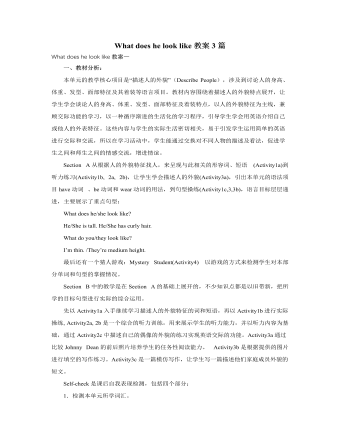
人教版新目标初中英语七年级下册What does he look like教案3篇
所需要用到的句子:Who is that?That is Jack. I like him.Why do you like him?I like him because he is interesting.Task 4: 设计理想中的人类Step one: 设计理想中的人类的外貌。把全班同学分成若干小组,学生可以边说边在纸上画出他们的模样。Step two: 设计理想中人类的性格。学生们可以把那些能描述性格的单词写在图画的旁边。Step three: 每组选出一名同学,其他同组同学提问,他作简单回答,并说明原因。所需用到的句子:What does he or she look like?He or she ...What is he or she like?He or she is ...Why?Because ...Task 5: 挑战性活动调查性格是天生的还是后天形成的,让每个同学回家去调查一下自己成长过程中性格是否有变化,具体是怎样的,为什么会这样? Teaching Aims:1. Enable students to have a general understanding of how to talk about people's physical appearance.2. Enable students to tackle some essential vocabularies and patterns about describing people. Provide them with necessary skills and methods.3. Create various chances for students to describe the persons they're familiar with, such as classmates, family members, teachers, idols, etc.

人教版新目标初中英语七年级下册Where is the post office教案2篇
Period 2 (3a----Section B 2c)Preview(Pre-task): Key points: What laAdd another information about their pen pals----their language on the cardnguage does she/he speak?She/He speaks....Does she/he have any brothers and sisters? Does she/he speak English?Preview(Pre-task): Add another information about their pen pals----their language on the cardKey points: What language does she/he speak?She/He speaks....Does she/he have any brothers and sisters? Does she/he speak English?Step 1 Revision1.Revisionand dictation of the new words 2.Revise the drills they learned yesterday.(by pairwork and grammar exercise)Step 2 Leading-inT has a conversation with one student. The conversation is following:---Do you have a pen pal?---Yes, I do.---What's your pen pal's name? ---His/Her name is....---Where is your pen pal from? ---He/She is from...---Where does he/she live? ---He/She lives in....---What language does he/she speak?He/She speaks...Write the new words on the Bb. They are following: EnglishChineseJapaneseFrenchStep 3 LearnLearn the new words with the whole class.Finish 3a with the students3b Pairwork T still does an example with one student Then the Ss practise in pairs. The example is following:--Curry Muray is my pen pal. He is from the United States.---What language does he speak?
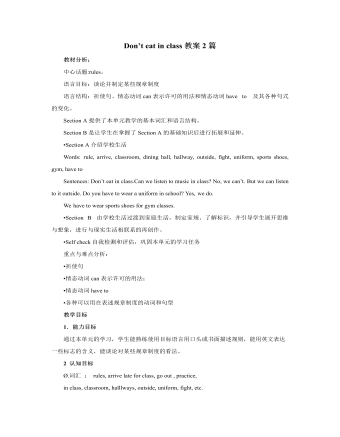
人教版新目标初中英语七年级下册Don’t eat in class教案2篇
Don’t fight. =You can’t fight. (板书,教读)教师把这些句子板书在黑板上,并请学生大声整齐地读祈使句和“can’t”句型,并让学生注意两种句型表达形式的不同和转换,“Don’t …=You can’t…”;并对学生说:These are our school rules. (板书,教读) You can’t break the school rules. Don’t break the school rules.(板书,教读)步骤3 :Practicea. T: Now, each of the students is breaking one of these rules.Please finish 1a.学生看图,完成1a的内容,检查答案并大声朗读校规。b. 听录音,完成1b,选出四位学生都违反了哪条校规;听之前,学生要读会英文名。c. 请两位学生朗读1c部分的句型;要求学生两人一组对话表演,SA扮演外校转来新生,SB告知本校校规。(学生可经过讨论,多说出他们想到的校规,不必只限于书上;教师应给予帮助)2) 第二课时(2a~4)步骤1 :warming up of revisionT: What are the rules at your school?学生使用“can”或祈使句表达各条校规;其中老师可引出“eat in the cafeteria outside”的表达。步骤2 :Practicea.T: Christina is an exchange student. She doesn’t know the rules. Let’s listen, what activities they’re talking about?学生听第一遍时,完成2a;第二遍时,完成2b;b. 请学生领读2c部分,看着2a完成的表格,理解2c活动的要求;分成小组针对2a进行问答;

人教版新目标初中英语七年级下册Where did you go on vacation教案
句型: Where did you go on vacation? I went to summer camp.Did she go to Central Park?Yes,she did.No, she didn’t语法:一般过去时特殊疑问句、一般疑问句及肯、否定回答。课时安排4课时第一课时:Section A:la,1b,lc,2a,2b,2c 第二课时:Section A:3a,3b,4第三课时:Section B:1,2a,2b,2c第四课时:Section B:3a,3b,3c,4 and Self Check第一课时教学目标掌握描写假期生活的形容词。假期里自己所做事情的简单表达。谈论假期做的事情及当时情况。谈论假期时旅游的天气,旅游者以及食物等。教学过程一、导入播放一首英文歌曲:Let’s travel 说明:通过让学生听节奏欢快迪斯尼英语歌曲Let’s travel.引入本节课谈论的话题vacation and travel. 让歌曲使学生的思维活跃,增强课堂气氛,激发学生提高学习英语的兴趣。T:How is the trip ?Ss : It’s pretty good/ happy/exciting /relaxing/busy/dangerous/ fantastic说明:这个问题是为了操练形容词。建议让多个Ss作答。鼓励他们用不同的形容词。上述个别形容词本应在第二课时中出现,但可以在warming-up中第一次非正式出现。这些形容词也可在老师的评价语中适时出现,以加深学生对词汇的印象。
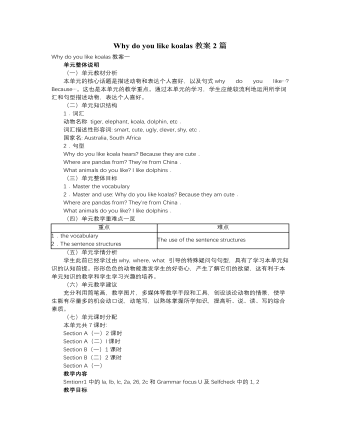
人教版新目标初中英语七年级下册Why do you like koalas教案2篇
单元整体说明(一)单元教材分析本单元的核心话题是描述动物和表达个人喜好,以及句式why do you like…? Because…。这也是本单元的教学重点。通过本单元的学习,学生应能较流利地运用所学词汇和句型描述动物,表达个人喜好。(二)单元知识结构1.词汇动物名称 tiger, elephant, koala, dolphin, etc.词汇描述性形容词: smart, cute, ugly, clever, shy, etc.国家名: Australia, South Africa2.句型Why do you like koala hears? Because they are cute.Where are pandas from? They're from China.What animals do you like? I like dolphins.(三)单元整体目标1.Master the vocabulary2.Master and use: Why do you like koalas? Because they am cute.Where are pandas from? They're from China.What animals do you like? I like dolphins.(四)单元教学重难点一览(五)单元学情分析学生此前已经学过由why, where, what 引导的特殊疑问句句型,具有了学习本单元知识的认知前提。形形色色的动物能激发学生的好奇心,产生了解它们的欲望,这有利于本单元知识的教学和学生学习兴趣的培养。
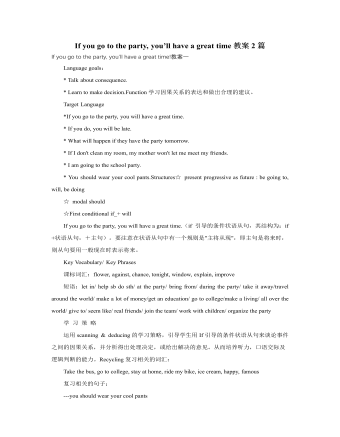
人教版新目标初中英语八年级下册If you go to the party, you’ll have a great time教案2篇
区分宾语从句、定于从句和状语从句宾语从句和状语从句,都叫做主从复合句。宾语从句主要是中考必考的,是初中阶段必掌握的从句,宾语从句主要是掌握三要素,所谓宾语从句,就是宾语在主从复合句当中充当宾语的一个句子,叫做宾语从句。主句的谓语动词是及物动词,后面如果是词或者是短语的话,是简单句,如果是句子的话,肯定是宾语从句。I know that he good at English.就是宾语从句,三要素,一要素是要注意连词,连词一共学了三类连词,一类连词是that口语当中可以省略,就像刚才说的那一句,I hear he is good at English.还有疑问代词、疑问副词,how where when,疑问代词、疑问副词。还有一类连词weather是否的意思,不是状语从句当中的如果,这一定要和如果区分开,这是是否。I don't know if he interested at English。宾语从句要注意if是连词。第二要素是语序,要用陈述举语序。比如说你家有几口人,我们都说How many people are there in you family?但是这是简单句,一旦说成宾语从句,你可以告诉我你家有几口人吗?Could you tell me how many people there are in you family ?

人教版新目标初中英语八年级下册What were you doing when the UFO arrived教案2篇
(一).知识方面: 1.培养学生能运用过去进行时来描述、谈论过去某个时间正在发生的事情或动作的意识和能力,能就过去某个时间正在发生的动作做出正确的描述。 2.培养学生的想象力和角色扮演的合作能力。 3.培养学生讲述过去发生的事情经过的能力。能正确运用一般过去时来讲述故事。 (二).技能方面: 1.本单元的语言目标是Talk about past events and tell a story(谈论过去的时间和讲述一个故事),围绕这一目标,要涉及句型: What were you doing when the UFO arrived? ----I was sitting in the barber’s chair. The barber was cutting my hair. 因此必须学习standing、studying、cleaning、sleeping、cooking、making、eating、cutting、等表示地点的词,以便为上述句型提供语言材料。2.学习过去进行时的有关知识。Was/were+现在分词,是该时态的表达式。 3.在学习过程中,要区分The boy was walking down the street when the UFO landed.和While the boy was walking down the street, the UFO landed.这两种由when和while引导的状语从句的句型结构。注意它们的不同。
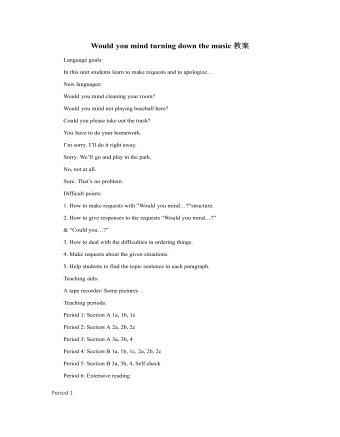
人教版新目标初中英语八年级下册Would you mind turning down the music教案
Step 4. Group work (4)1. Ask a pair of students to read the dialogue. Say, This activity provides speaking, listening and writing practice using the target language.2. Ask students to complete the work in groups.3. Check the answers with the whole class. 4. Explain some of the language points. Step 5. Word review (Self check 1)1. Ask students to read the words and the phrases given. 2. Fill in the blanks with proper forms of these words to complete the sentences. 3. Check the answers with the whole class. Homework:Do activity 2 on page 57 after class. Period 6Teaching aims: 1. Teach vocabulary words and the useful expressions. 2. Enable the students to learn etiquette in different culture. 3. Help the students learn how to behave politely in public places and in daily life. Teaching procedures:Step 1. RevisionHelp students to review the function of making requests through a free talk. Then lead them to the topic of etiquette. Explain the meaning of etiquette. Or, ask students to look it up in the dictionary. Step 2. Pre-reading (Section 1)1. Ask students to read the picture and make a list with their partner about how many rules of etiquette can be seen being broken.

人教版新目标初中英语七年级下册How was your weekend教案2篇
Teaching Goal:1. General aims:Talk about recent past events2. Particular aims:A. Language Focus.Talk about recent past events and think of the past events.B. Language goalsHow was….?It was …What did …do over the weekend?C. Language structures:(1). How was your weekend? I was great. Pay attention to no form.(2). What did you do over the weekend? I played soccer. We went to the beach.D. Useful words and phrases:Words: was, did, went, beach, over, project, test, wasn’t, false, number, geography, spend, week, most, mixture, their, had, little, cook, read, saw, change, everyone, sit, sat, no, anythingPhrases: did one’s homework, played soccer, cleaned my room, went to the beach, played tennis, went to the movies, on Saturday morning, over the weekend, cook … for, what about, do some reading, have a party, talk show, go shoppingE. Grammar language:Present simple past tenseRegular and irregular verbsF. Learning strategies:Tour and holidaysG. Interdiscipinary:H. Emotion and manner:Teaching time: 5 periodsTeaching procedures:Period One教学步骤、时间 教师活动 学生活动 媒体应用Step 1Free talk 3’ Ask some questions like:Who’s on duty today?What’s the weather like? Answer and talk about something.让同学们回答下列问题1. Do you like weekend? (Let some students answer)It takes them three minutes to talk about the question.2. Why do you like weekend? (let the students answer) Most of the students like the weekend此时教师用汉语问:“在周末期间问你干了什么?这句话用英语这么回答?Let the students guess.At last the teacher give them right answer3. What did you do over the weekend?(板书、学习)
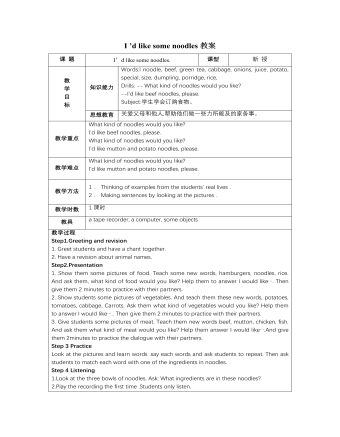
人教版新目标初中英语七年级下册I ’d like some noodles教案
教学过程Step 1: warming-up Sing a song---------“food and drink” Step 2: Revision1 Dictation2 Revise: What kind of noodles would you like?I’d like …What size bowl of noodles would you like?I’d like…Step 3: Presentation1 show pictures of food, ask students say the words.2 Students read the newspaper ad in 3a. Fill in blanks with words in the box. Then read the ad together, the teacher explains some difficult language points.3 Check the answers Step 4 PracticeAsk students to finish 3b in the same way according to 3a. Students read the short passage and fill in the blanks .At last, check the answers.Step 5 productionAsk students to write their own ad for dumplings, noodles, drinks, and other foods they know. Then ask students to read their partner’s ad. Then order food and drink from their partner.Step 6 Home workGroup work – make an ad about “food and drink”
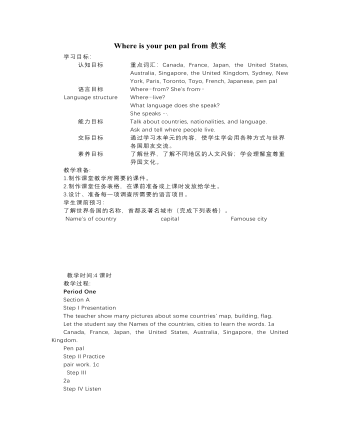
人教版新目标初中英语七年级下册Where is your pen pal from教案
2.1Match the country with the language.Step II Reading3a? let the students read the letter fast and answer the questions.? Let the students ask more questions about the letter as possible as the can.Step III Writing3b.Step IV. Pairwork2cStep V Listening2a, 2bStep V. HomeworkExercises book(1) P3Exercises book (2) P3Period FourStep I . Dictate the words and sentences in Unit1.Step II. Self-checkStep III. Check the answers for Exercises book in the unit.Step IV. Home workRevise and preparation for unit 2.教学反思:通过本单元的学习,学生基本可以谈论人们的国籍,居住城市及其所说的语言,通过书信方式去介绍自己并寻找笔友。但在涉及到国外的一些城市时,学生对这方面的知识相对欠缺,能介绍的城市并不多,也反应出学生课前预习不充分,这跟学生学习条件也有关,大多数学生无法通过网络获取所需信息。因此,在以后的教学中要多指导学生通过计算机网络获取信息,拓宽知识面。
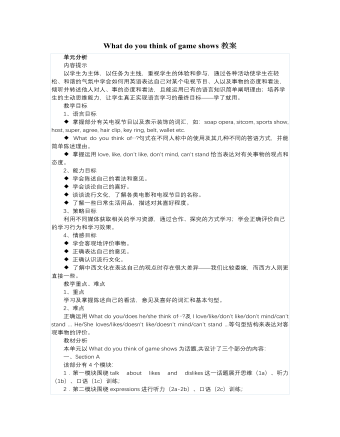
人教版新目标初中英语七年级下册What do you think of game shows教案
五、教学Section B-2c1. Pair work: What do you think of the belt/sunglasses/…? What does your father/mother/… think of your scarf/belt…?2. Group work(1). Teacher shows some different kinds of school uniforms (制服)and asks : “ What do you think of your school uniforms? If you have a chance to choose your school uniforms, what kind would you like to choose?”(2). Discuss in groups.(3).Get some Ss to report in class.说明:这一步旨在让学生运用已有的语言知识谈论对事物的看法和意见,并简单阐明理由,培养学生的主动思维能力和运用英语的能力。六、教学拓展调查电视节目的收视率任务:调查你周围的人对现在各种电视节目的反响。活动过程:1.教师布置任务,让学生调查周围的人(包括他的亲戚朋友和邻居)喜欢收看哪方面的电视节目。2.学生进行调查活动,运用本单元所学的句型What do you think of….? (Why?)What's your favorite game shows?What do you think of talk show?I doesn’t mind it.I like it.I love it.I can’t stand it.3.记录下排在前10位的TV Program,填写调查表,比较其收视率。
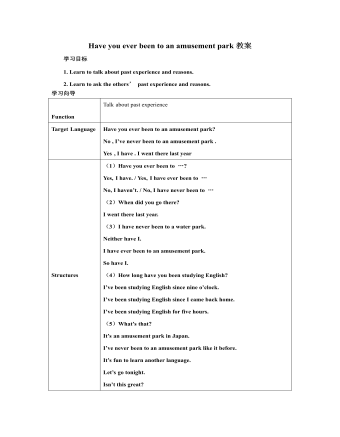
人教版新目标初中英语八年级下册Have you ever been to an amusement park教案
(1)Have you ever been to …? Yes, I have. / Yes, I have ever been to …No, I haven’t. / No, I have never been to …(2)When did you go there? I went there last year. (3)I have never been to a water park. Neither have I. I have ever been to an amusement park. So have I. (4)How long have you been studying English? I’ve been studying English since nine o’clock. I’ve been studying English since I came back home. I’ve been studying English for five hours. (5)What’s that? It’s an amusement park in Japan. I’ve never been to an amusement park like it before. It’s fun to learn another language. Let’s go tonight. Isn’t this great?space museum, amusement park, water park, South America, Peru, Holland, European culture, tour guide, flight attendant, musical instrument, more than, be from, get to, take lessons, neither, discover, graduate, change